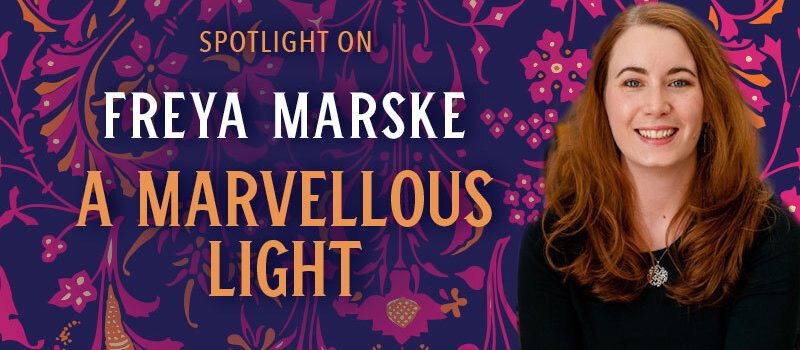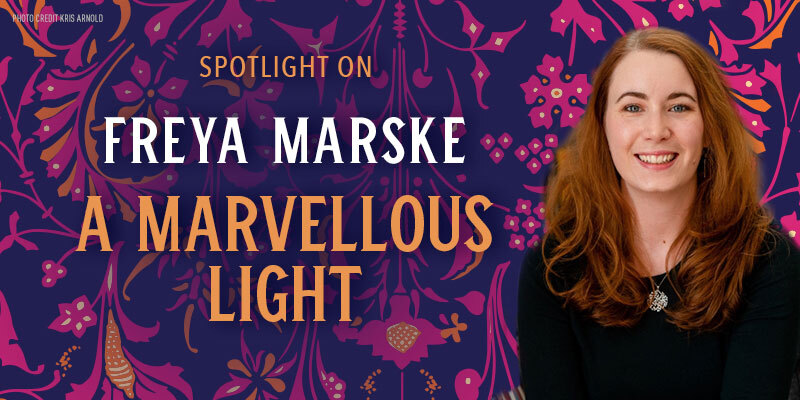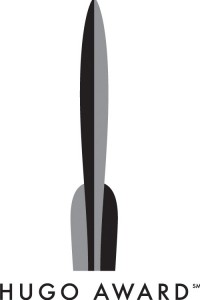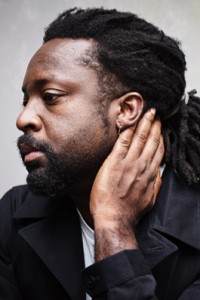Spotlight on: Freya Marske
Tell us about your debut novel A Marvellous Light—the world where it takes place and the characters who inhabit that world.
A Marvellous Light is a historical fantasy novel that follows two men as they become reluctantly embroiled in a conspiracy of murder, curses, and contracts. Robin Blyth is a sunshine-hearted jock who’s trying to ignore all his responsibilities when he’s accidentally named as the government liaison to a hidden world of magicians; Edwin Courcey is a frustrated, academically minded magician with far less power than the rest of his family, who is forced to deal with the mistake that is Robin’s sudden appearance in his world. These two are extremely dissimilar and take an instant dislike to each other. (So, obviously, they’re going to fall in love.) It takes place in a world of bureaucracy, homicidal hedge mazes, and grand old magical houses that have a mind of their own.
A Marvellous Light is the first book in the Last Binding trilogy. Can you give us any hints for what the future of the series holds?
Each of the three books has its own romance and its own primary characters, building up a six-person ensemble—enough for a heist crew, if that’s what you’re into. (Is that a clue about book three? Yes.) Book two takes place entirely on a transatlantic ocean liner, and it reveals a lot more of the backstory that has led up to the trilogy’s events. Also there are ghosts. (Though no collisions with icebergs, I promise.)
 The series takes place in an alternate version of Edwardian England. What appeals to you about that setting?
The series takes place in an alternate version of Edwardian England. What appeals to you about that setting?
I’m going to be honest here: a lot of it was due to the ocean liner.
But I find the Edwardian era fascinating in its own right. It’s a slim little piece of English history at the very start of the 20th century, and it teeters on the border between the technological changes of the long Victorian era and the huge social upheaval that will occur with the First World War, which is just on the horizon. The rigid class system is beginning to shift, and the British Empire to crumble at the edges. The themes of disruption to the status quo and questioning the source and the cost of power are very important to the trilogy.
I’m also wildly into the Arts and Crafts movement and Art Nouveau, which will become… obvious… when you read the books. Half the fun of historical fiction is the set-dressing.
Tell us a bit about your research process for the book.
There was definitely a lot of wandering through art galleries and National Trust houses full of William Morris wallpaper to properly grasp the Aesthetic. I read a few books focusing on the social history and day-to-day life of manor houses in this era (think Downton Abbey), but most of the research that I did was to answer specific questions that came up as I was writing. What posts did women have in the Civil Service? What sorts of motorcars were popular? Which stations of the London Underground existed? How did gay men navigate a homophobic society and form relationships? (An excellent excuse to reread E. M. Forster’s Maurice.)
You’ve described the novel as a “fantasy of very bad manners.” Can you tell us why that kind of story appeals to you? What books or media inspired the tone and style of your book?
Fantasy-of-manners appeals to me because I love how personal the stakes are, and the focus on relationships and how characters are confined by the rules of their societies. Plus: I’m an absolute sucker for manor house parties full of hijinks, terrible people, awkward dinner parties, and furtive after-dark liaisons. Especially when you add murder to the mix. I’m going to put this down to the combined influences of Agatha Christie, Jane Austen, and P. G. Wodehouse.
In the realm of SFF that was influential to the book, I have to tilt my hat to Zen Cho’s wonderfulSorcerer to the Crown, and K.J. Charles’s queer historical romances, especially Spectred Isle and the Magpie Lord books. And above all: To Say Nothing of the Dog by Connie Willis, the ultimate romp, featuring a late-Victorian country manor house party at which two people are secretly trying to solve a time-travel mystery while bickering their way toward a romance. Perfection.
In addition to writing, you also cohost a podcast, Be the Serpent. Tell us about the show.
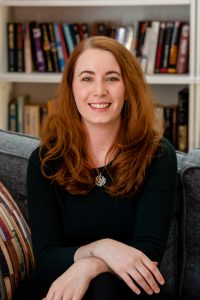
Be the Serpent came about because myself and two of my close author-friends, Alexandra Rowland and Jennifer Mace, already spent a lot of time gleefully dissecting speculative fiction and fanfiction and discussing the tropes we loved. So we simply started recording ourselves doing it. The very first episode is a close reading and comparison of an Ursula Le Guin short story and a piece of fanfiction about robot boners. That… pretty much set the tone for the next few years. We’re planning to wrap up the show at the end of 2021, but it’s been an amazing ride and introduced me to some incredible media—and we’ve been nominated for three Hugo Awards along the way!
Is there anything else you’d like our readers to know? Upcoming work or other projects of note?
As well as working on the second and third books in the Last Binding trilogy, I’m writing some contemporary romance novels that I’m very excited about. And there are a handful of fantasy and sci-fi stories bubbling away in the back of my mind, slowly accumulating detail while they wait for me to have the time and opportunity to write them; one of them is about magical spies in space and another is a Cinderella retelling, because I intend to have a career that covers wide ground!


